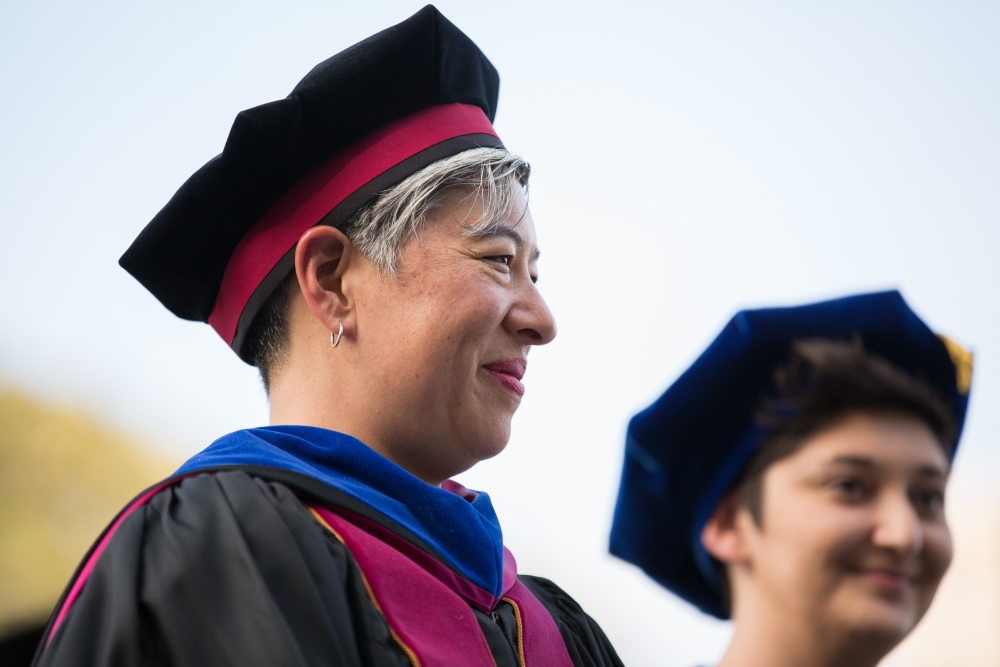
Expanding Horizons
UC Santa Barbara is among 29 universities nationwide selected to participate in a collective effort to gather and use data about the careers of Ph.D. students and alumni.
Grants from the National Science Foundation and the Andrew W. Mellon Foundation will support data collection about Ph.D. careers in STEM and humanities fields. UCSB is part of the University of California Consortium spanning all 10 campuses in the system.
“I am delighted that the University of California was selected to take part in this national project to track the broad career outcomes of our doctoral alumni,” said Carol Genetti, dean of UCSB’s Graduate Division. “Being part of this initiative will allow us to compare our outcomes against national benchmarks, as well as to further hone our professional development offerings to ensure that they best suit the career aspirations of our doctoral students.”
Over the course of the multiyear project, universities will collect data from current Ph.D. students and alumni with surveys developed by the Council of Graduate Schools (CGS) in consultation with senior university leaders, funding agencies, disciplinary societies, researchers, doctoral students and alumni. The resulting data will allow universities to analyze Ph.D. career preferences and outcomes at the program level and help faculty and university leaders strengthen career services, professional development opportunities and mentoring in doctoral programs.
“The UC project will also include more in-depth work with humanities disciplines, as the UC Humanities Research Institute will lead a multicampus team of PhD researchers to conduct focus groups of humanities PHD alumni at work,” Genetti explained. “This will integrate well with a recent yearlong project led jointly by the UCSB Graduate Division and the Division of Humanities and Fine Arts, and funded by a grant from the National Endowment for the Humanities. That project led to a divisionwide conversation on engagement of humanists with the broader public and the relationship of such work to graduate student professional development and career opportunities. The new project will provide very helpful input as we build on our conversations and develop new academic programs.”
Providing a deeper understanding of Ph.D. careers in the humanities is in fact one of the benefits of the national endeavor.
“The initiative meshes well with comparable work on expanding career horizons and opportunities for humanities Ph.D.s,” noted Jim Grossman, executive director of the American Historical Association and a member of the committee that advised CGS on survey development. “This work will give us critically needed information about diverse career pathways among humanists, many of whom pursue careers beyond the professoriate. Its results will empower doctoral students and alumni working to understand and expand the career options available to them.”
According to Rush Holt, CEO of the American Association for the Advancement of Science, the project will also expand the country’s understanding of the STEM workforce.
“We already know that Ph.D.-trained scientists contribute to the STEM workforce in every sector,” Holt said. “One of the important things this project promises to give us is a better picture of the skills needed to be successful in the wide variety of careers available to today’s and tomorrow’s graduate students.”
With the national dataset analyzed by CGS, universities can compare their data on Ph.D. career preferences and outcomes. They also will be able to use the data to communicate the career trajectories of Ph.D. alumni to current and prospective students, helping them to make more informed selections of Ph.D. programs.
“Today, universities recognize that Ph.D. students aspire to a wide variety of careers, including academic research and teaching,” said Suzanne Ortega, president of CGS. “Knowing what your alumni do — and how well they are prepared — is becoming the new paradigm, and our university partners are leading the way for the entire community of doctoral institutions.”
The first wave of the survey will be sent to Ph.D. alumni in fall of 2017. CGS will begin publishing the first wave of findings in fall 2018.



